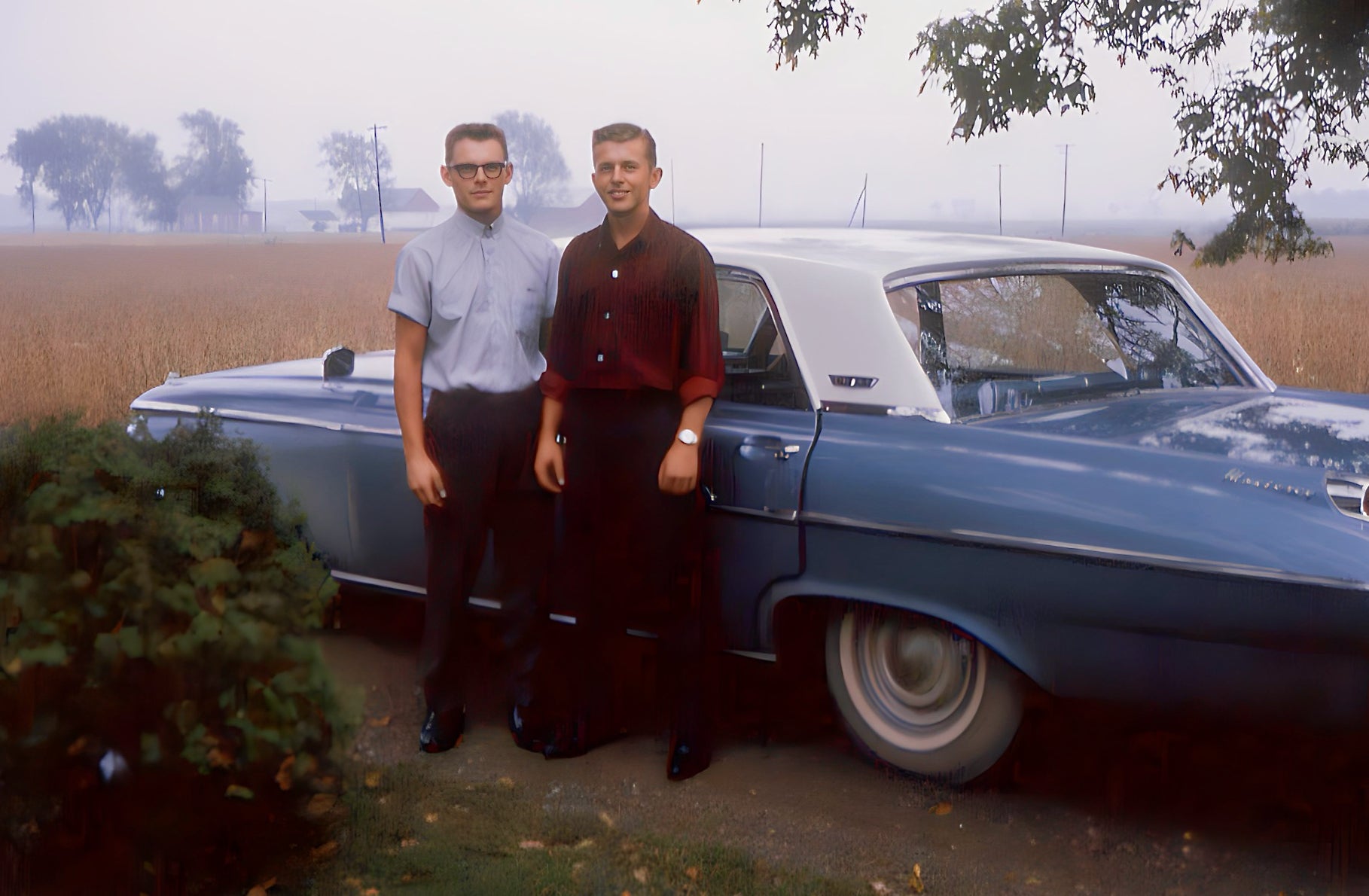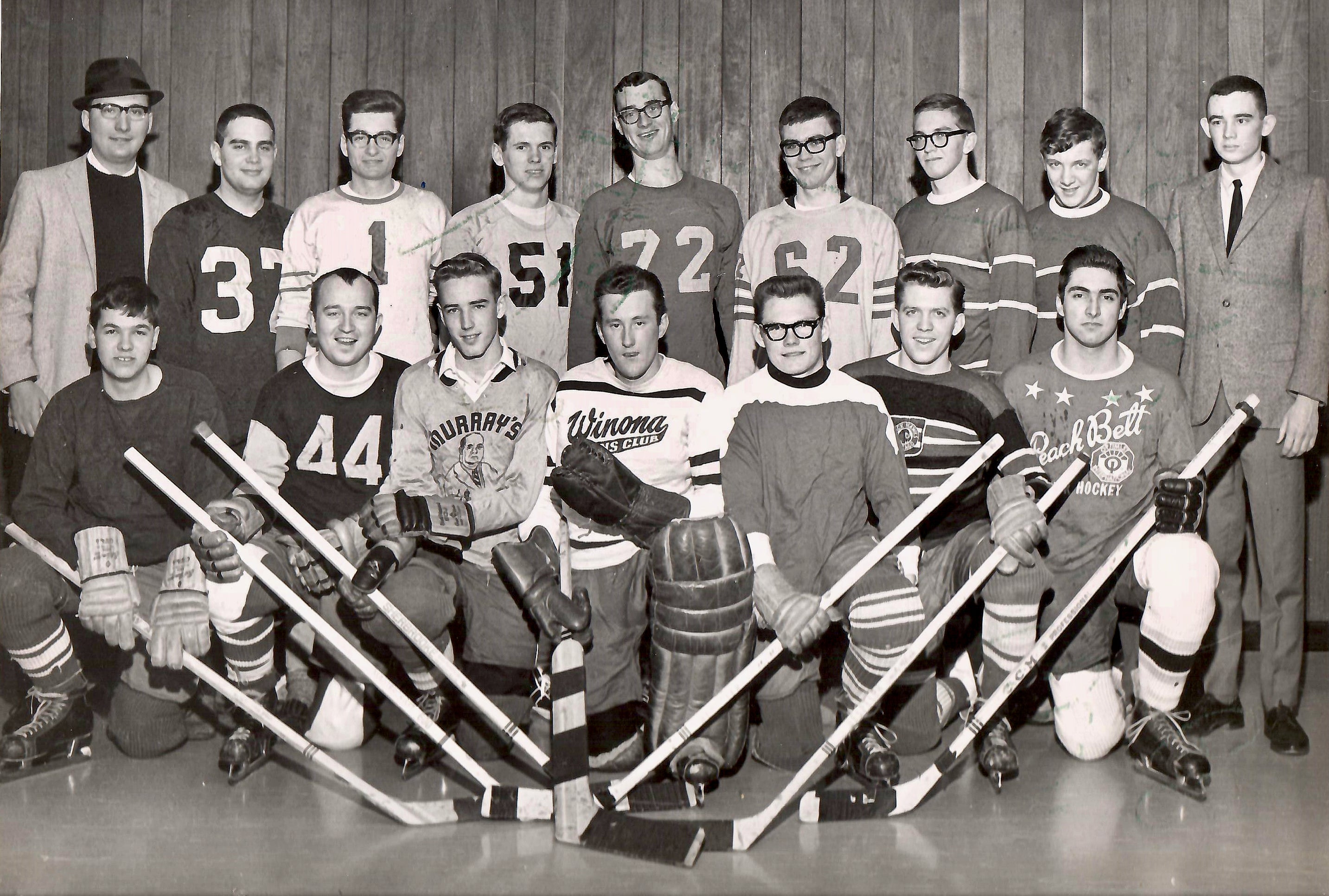Understanding Math through Play – Rudy (BMATH 1968) and Beverly (BA 1968) Neufeld
On a Saturday morning in late September, Rudy Neufeld is sitting at a small table in a meeting room inside London Public Library’s Byron branch. Standing around him are 13 elementary school pupils, their eyes fixed on a tiny KaiBot, no larger than the palm of a hand.
Rudy goes through the basic steps of instructing the little robot on how to move, using nothing but small cards that are spread out on the table. He’s doing it upside-down, from his point of view, so that his young audience can get a closer look.
Once he’s arranged the cards in sequence and scanned them into the tiny machine, it comes to life. It moves forward, LED lights flashing and gears turning. Then it turns left, instead of right. “Ooops, that’s a mistake,” Rudy says. “But remember: mistakes aren’t a bad thing — they’re learning opportunities.”
Within a few more minutes, each child has a KaiBot at their own desk, ready to take their first small steps into the world of coding. A half dozen parents lean over the youngsters to watch. They can’t help but be intrigued.
As they lean into their latter 70s, Rudy and Beverly Neufeld of London, Ontario, have every reason to leave desks, classrooms, and curricula behind. Both enjoyed long, illustrious careers with their local public school board. Rudy led the mathematics departments at two secondary schools; Beverly taught Grades 1 and 2 at two elementary schools for 32 years. But the impulse to seize new opportunities in teaching and learning has taken them well past the point at which most teachers put up their feet in retirement.
They met at Conrad Grebel College. In terms of the College’s residence, Rudy is part of the Day 1 cohort. During Grade 13, he’d planned to stay closer to his Leamington home for post-secondary studies. “I wanted to play baseball. That’s all that mattered: girls and baseball,” he recalls.
But Rudy’s father, a leading minister at Leamington United Mennonite Church, had come to know professors Walter Klaassen and Winfield Fretz, and was supportive of the nascent effort by Ontario’s Mennonite conferences to build a college on the campus of the University of Waterloo. So, on a spring day in 1964, Rudy hitched a ride along with Ed Cornies and his father to check out the new facility.

What they saw was spartan. The residence still lacked finishing details; the carpets hadn’t yet been installed. But the glimpse of the new building adjacent to a sprawling and fast-growing University of Waterloo campus was enough to capture their imaginations. Rudy and Ed became roommates in their first year.
Meanwhile, Beverly Mathies, who’d grown up on a farm outside St. Catharines, Ontario, was enrolled in Grade 13 at Grantham High School. Partway through the school year, she too took a tour of Grebel. “I came home and said, ‘That’s where I’m going.’ I just had such a good feeling about the place.... I loved the university feeling. I don’t know why, but for me that was just made to order,” Beverly recalls. She arrived at Grebel as Rudy was beginning his second year.
They struck up a friendship, then a romance. Given the College’s policies about segregating men and women to their residence floors, Beverly and Rudy had to find creative ways and places to be with each other after classes had ended for the day. The College’s stairwells offered one rendezvous point; a bench outside the Chapel’s doors was another. They took frequent long walks around campus.
In the spring of 1968, Rudy finished a four-year Bachelor of Mathematics degree, while Beverly completed a three-year Bachelor of Arts with majors in History and German. They were married at Grace Mennonite Church in St. Catharines in the Christmas break of that year.
It may seem unfathomable today, but the late 1960s offered university graduates nearly unlimited possibilities in terms of jobs. The Neufelds decided they would become teachers. Where? Somewhere between St. Catharines and Leamington, they thought. London, then. Starting a career was as straightforward as choosing a city and submitting job applications.
While Beverly cruised along a career path in early-years education, Rudy grew increasingly restless. A forward-looking impulse led him to attend international mathematics conferences, often at his own expense, then try new approaches with his students. Occasionally, he’d hire teachers to cover his high school classes while he attended meetings and symposia.
By the late 1970s, with the help of hired programmers and mentors, Rudy had developed interactive software for students from kindergarten to Grade 10. But a pivotal moment occurred in 1985, when Rudy met Dr. Seymour Papert, the MIT professor whose influence came to bear on the fields of artificial intelligence and mathematics and who developed a philosophy of children’s education referred to as “constructionism.” Children learn best, Papert argued, through activities that resemble play — solving interesting problems through tinkering and unstructured activity. “That meeting determined my future in education,” Rudy says. He used Papert’s powerful coding language to write Learning Math with Logo, which was adopted by some schools in Ontario and Virginia.
Rudy, Beverly, and their son Jeremy incorporated Neufeld Learning Systems in 1999. In 2000, the Neufeld team released Understanding Math, a software-based program that helped pupils between Grades 4 and 10 to grasp concepts such as fractions, integers, exponents, equations, probability, and geometry. Even as that package went through a half-dozen iterations, the team worked on another product for kindergarten to Grade 3 called Understanding Numeration, focused on teaching children concepts such as counting, comparing and ordering, and mathematical operations.

“The research was there — it was right in our faces that what Rudy was doing was the right way to go,” says Perry Gelakis, who was seconded by the local publicly funded school board to Neufeld Learning Systems to help schools train teachers on the new “constructivist” approach. Gelakis spent years working with Rudy in both Canada and the United States.
Understanding Math (UMath) became so successful that Rudy left his teaching job with the Thames Valley District School Board in 1999, after a career spanning 30 years. The Neufeld home in suburban London became a beehive of activity, as teams of authors, programmers, and consultants spent long days inside an annex Rudy and Beverly had built as an addition to their house. At one point, the enterprise even ran afoul of the City of London’s zoning bylaws, which restricted the number of employees that could work out of a home-based business.
For Rudy, the success of the curriculum meant 20 years of travel, both to sell the product and to support it with meetings, tutorials, and conference appearances. Ontario and Nova Scotia were important markets, but UMath saw adoption in U.S. states such as Florida, Texas, New York, Ohio, Michigan, Nevada, Virginia, Missouri, South Carolina, Louisiana, and Alabama. The Neufelds’ younger son, Josh, became involved in the business as well. But the entire team credits Beverly for administering and coordinating the effort from their London home. She was “the rock… the final say on some marketing and conceptual matters,” Rudy says.
The pursuit of new markets and participation in conferences took Rudy to international destinations too, including New Zealand and Dubai. During two weeks in Micronesia, despite an unreliable electrical grid, teachers rowed boats to the island at which Rudy was teaching to learn his techniques.
These days, the Neufeld sons have dispersed, but the passion Rudy and Beverly hold for education and new ways of learning remains evident. Neufeld Learning Systems released First Steps in Coding to Learn, an ebook of lessons for Grades 3 to 8, in 2022. This year, Rudy is collaborating with a game inventor in New York on creating a digital game-based math activity. He’s also partnering with Kai’s Clan in New Zealand (inventors of the KaiBot and the learning environment Kainundrum) on a K to Grade 8 product that teaches coding through mathematical thinking and game-based learning. A new JavaScript version of the Neufeld team’s foundational software, titled UMathXI is launching soon.
The enhancement of mathematics instruction for First Nations students is a prime mission for Rudy. His Understanding Math program was used on Pukatawagan Reserve in Manitoba, enthusiastically received by the students. A new initiative in Labrador, this year, will see the introduction of robotics, coding, and the introduction of the new Understanding Math revision, by training a core of teachers in the use of the materials and offering ongoing support.
Rudy is still adding to his Delta Airlines million-miler status, but with fewer trips. Meetings and conference appearances are sometimes replaced by teleconferencing. The company now has an online shop. Yet despite changes in media, technologies, educational approaches, market conditions, and the retirements of longtime colleagues, Rudy and Beverly still haven’t dismantled the home office.
Rudy is still excited to interact with so many people who inspire him to keep going as technology changes. It does not require him to travel as much. Yet, the opportunities, the drive, the inspiration are still there.
The Neufelds' story is part of Grebel's 60 Stories for 60 Years project. Check out our 60 Stories page for more stories in this series. If you would like to nominate a Grebel alumnus to share about their experiences at Grebel, please submit a nomination form.
By Larry Cornies